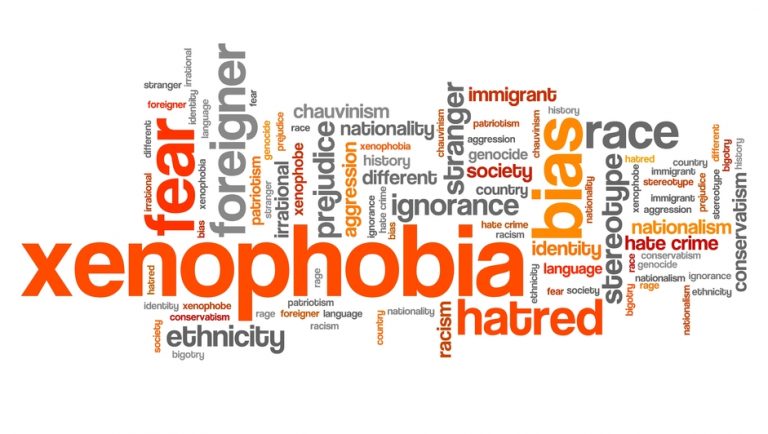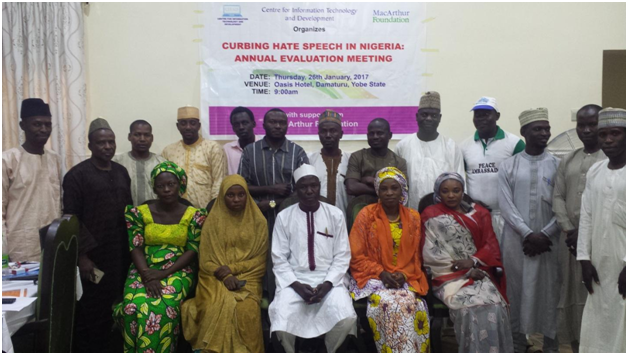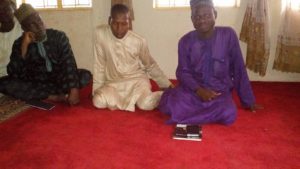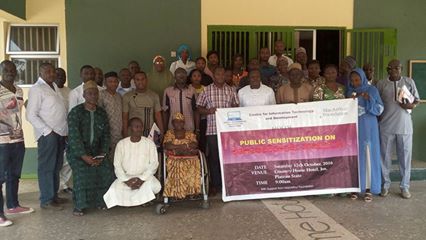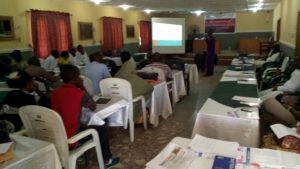On Tuesday 11th October, 2016, the Centre for Information Technology and Development (CITAD) organized a one day Public Sensitization Lecture on Hate and Dangerous Speech  in NANNM Secretariat Damaturu, Yobe State,Nigeria. Â
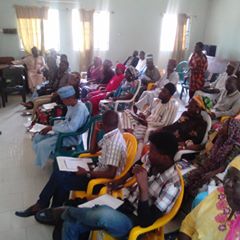
The event started with registration of participants at 9:00am and participants self-introduction which was the next item on the agenda. . Thereafter, Isah Garba being the Project Coordinator and Senior Programmes Officer gave a welcome remarks on behalf of MacArthur Foundation and Center for Information Technology  andDevelopment (CITAD) who are the conveners of the event. Welcoming all participants to the event,  he  briefed them  on what  CITAD does  as an organization in general and specifically in this project which include monitoring of hate and dangerous speech online and a lot of peace promotion activities and campaigns. He further appealed to the participants to make the occasion participatory by  making their contributions and not only  listening to the speakers.
The first paper presented was  on Understanding Hate/Dangerous Speech which was facilitated by  Isah Garba who started  with a question to the participants: Can someone tell us what hate speech is? Yusuf Tijjani Ali gave syntax meaning of both words HATE & SPEECH and also gave example of Fulani word ‘KADO’ which refers to non-fulani tribe as well Kanuri ‘Kirdi’ to him it was insult word to downgrade the value of other tribes.
The facilitator showed the pictograph of what happed in Rwanda and narrated the story in brief to make audience understand the concept and danger of hate speech better and take lesson instead . There is no single definition of hate speech accepted globally by all scholars but any speech that fall under one of these based-lines:
- Speech that denigrates people on the basis of their membership in a group, such as an ethnic or religious group.
- Speech can harm directly or indirectly, or both.
- Speech has a reasonable chance of catalyzing or amplifying violence by one group against another, given the circumstances in which it was made or disseminated, it is Dangerous Speech
- A Speech in this context includes any form of expression, including images such as drawings or photographs, films, etc
- Note dangerous speech is a part of hate which is capable of  mobilizing people to action
- So an ordinary trader could say spiteful or inflammatory things to his customer or neighbor but because neither have the capacity to mobilize others into action it does not qualify for dangerous speech
- We shall see that it is this capacity to catalyze people into action that is critical to the specific speech act we refer to as dangerous.
He called the attention of all participants to note or consider our historical tradition of jokes that have been in use as a means of resolving conflicts in our societies such as that which exist between Fulani and Kanuri , Â Â Kanawa and Zazzagawa, or among occupations like butchers and cattle rearers etc. Â
He then explained how lack of means of verification and manipulation of source of information can make simple hate speech to escalate violence   citing example of what used to  happen before the  coming of  GSM or Internet Network where people use rumor to take action against other tribes or religion due to the  communication gap or lack of means of verification, but thank to ICTs development for closing that  space where anyone can verify any news by using ICTs such as GSM, Media Stations or Social Media before taking action even though it is also  seen as a medium for disseminating hate and dangerous speech
After  tea break, Strategies for countering hate speech session was facilitated by Ibrahim Nuhu who started by going back to the definition of hate speech  to refresh their mind the more and draw their attention to the fact that   before  you counter any speech you must understand hate and dangerous speech. : Countering is the general strategy to eliminate or reduce the potentials of a dangerous speech to catalyze into violence through counter speech, this may be to: neutralize the message of the dangerous speech item, Get the speaker to retract and possibly apologize and ensure people do not act on the basis of the message of the speech. Counter speech is any speech/act that seeks to neutralize or convert hate speech.
Countering is different from peace campaign, they but share the same goal and purpose. Countering is the general strategy to eliminate or reduce the potentials of a dangerous speech to catalyze into violence through counter speech.
GENERAL DISCUSSION, Â COMMENTS QUESTIONS AND OBSERVATIONS SESSION:
During this session, the forum  became very interactive with questions and comments received from participants some of which are noted below:
√ We want to know the procedure of technology-based reporting by using facebook? Monday Dala asked. Ibrahim Nuhu responded by showing the procedure.
√ What about if people perceived your message in wrong way? Asked by Ahmad BRC. Isah Garba responded by calling audience to be straightforward and cautioned against use of ambiguous words. And in the event you did that and got misquoted you need to immediately retract and explain in the most simple and easy manner for your audience to understand.
√ constitutionally there was freedom of information and expression, can CITAD protect me if someone retaliate or attack  me? Ahmad Usman Abdullahi asked.  You have to report him to social media he used or CITAD, if in the market report him to sarkin kasuwa, his union, traditional rulers or police. Isah Garba responded. Â
Recommendations:
- I have spent many years attending seminars and workshops but never  came across with most important one as this because it deals with peace building, saving lives and properties, my concerned here was the implementation of this project because it may solve the problems of Nigeria today. When it comes to religion or ethnicity area of the people use traditional rulers or religion leaders to sensitize their followers because it very sensitive_By Uche
- The representative of Director School services called all participants to make sure they convey   the knowledge they acquire to their respective communities and entire seventeen (17) local government areas of the state. Youths at the  event really indicated interest in supporting the course of peace and staying away from hate and dangerous this workshop is a success_Dauda Hassan Katuzu
- What I have to say was thank you because most of the things I don’t know them and the little I know I don’t even put consideration on them even when I was browsing but now it come to my notice that there are some things you have to notice/considere  every time one goes  on internet. So thank you for this opportunity-Joy Buba student from Federal Poly Damaturo.   Â
Lastly, Isah Garba  discussed with the Secondary School teachers  representing the invited secondary schools on the  establishment of  Peace Clubs in some selected secondary schools as  approved by ministry of education and that is why the teachers of those schools were here with us present. The ideology behind was to change the mindset of youth at adolescent stage to come up with peace ideas  by promoting peace within themselves in schools and to their respective communities at large. He also called the name of all schools suggested and the teachers  selected the patron of that Peace Club who will guide the students and lead them toward achieving desired goals.
When students graduate from secondary schools and gt get admission into tertiary institutions they  will join Student4Peace which  is  an  advance level of secondary school peace club normally found at the tertiary level. The major activities  are to help in peace campaign in their respective schools, communities, state and country at large by using social media, advocacy visit etc. the student 4 peace members have the opportunity to get connection with mentors who will guide him to achieve his target desire within the country and outside.     Â
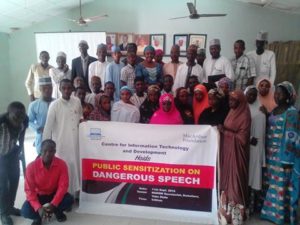
The total Participants were forty seven (47) in number; forty seven percent (47%) of which   were female while fifty three percent (53%) were male.
